Become a digital nomad in Europe obtain a digital nomad visa
In an increasingly interconnected world, the concept of becoming a digital nomad has gained significant popularity. The Digital Nomad lifestyle means embracing a lifestyle that allows individuals to work remotely while traveling and exploring the world. If you are looking to move to Europe and live a digital nomad life here is everything you need to know about the 22 Countries where you can apply for a digital nomad visa.

Many digital nomads choose to visit and work remotely in Europe using a tourist visa. However, for many third-country nationals, they can only stay in the Schengen Area for 90 days out of 180 days. The Schengen area is essentially 27 European countries that do not have border control for the EU citizens of those countries. Non-EEA nationals can travel to Schengen without a visa, but they cannot stay for longer than 90 days in 180.
Frequently Asked Questions: Become a Digital Nomad in Europe
What is a digital nomad and how can I become one in Europe?
A digital nomad is someone who uses telecommunications technologies to earn a living and conduct their life in a nomadic manner. To become a digital nomad in Europe, you can work remotely while exploring different locations across the continent.
Do I need a visa to work as a digital nomad in Europe?
As a digital nomad in Europe, you may require a visa that allows you to work remotely within the region. Some countries offer specific digital nomad visas or residence permits for remote workers.
What are the income requirements for becoming a digital nomad in Europe?
When planning to work as a digital nomad in Europe, it’s essential to check the income requirements set by each country you intend to visit. Make sure you have a sufficient monthly income to support your lifestyle.
Which European countries are popular for digital nomads?
There are several European countries that are popular among digital nomads due to their high quality of life, affordable cost of living, and vibrant digital nomad community. Countries like Croatia, Greece, and Romania offer attractive options for remote workers.
How can I apply for a digital nomad visa in Europe?
To apply for a digital nomad visa in Europe, you typically need to demonstrate your ability to work remotely and meet the specific requirements of the country you wish to reside in. Some countries, like Croatia and Greece, have launched dedicated visas for digital nomads.
Why should you get a digital nomad visa in Europe?
Europe, with its rich cultural heritage, stunning landscapes, and diverse cities, has become a sought-after destination for digital nomadism for those looking to immerse themselves in new experiences. From the romantic streets of Paris to the medieval charm of Prague, Europe offers an array of destinations that combine work and play seamlessly. The continent is well-connected, making it easy for digital nomads to navigate between countries and enjoy the best of what each has to offer.

One of the key benefits of being a digital nomad in Europe is the opportunity to experience the cultural and linguistic diversity of the continent. With a generally affordable cost of living in most European countries that offer a visa for digital nomads.
Moreover, Europe boasts an array of co-working spaces and offer digital nomad visas and have digital nomad communities, allowing individuals to connect with like-minded professionals and establish a support network while on the move. These spaces often provide all the necessary amenities, such as high-speed internet, comfortable workstations, and networking events, ensuring that digital nomads can remain productive and focused on their work.

You’ll need to work with popular digital nomad jobs and possible need to show experience in coding, marketing, consultancy, writing, graphic design, photography, web design, and many, many more. So, if you’re dreaming of a life where work and travel merge seamlessly with remote work, Europe might just be the perfect destination for you to embark on your digital nomad journey. Embrace the freedom to work from anywhere and discover the beauty and diversity that this extraordinary continent has to offer. A digital nomad visa allows you to do a remote job and temporarily live in a foreign country. As of 2023 22 European countries offer a digital nomad visa for digital nomads and remote workers, with more to come!
How do I get an EU Passport and EU Citizenship?
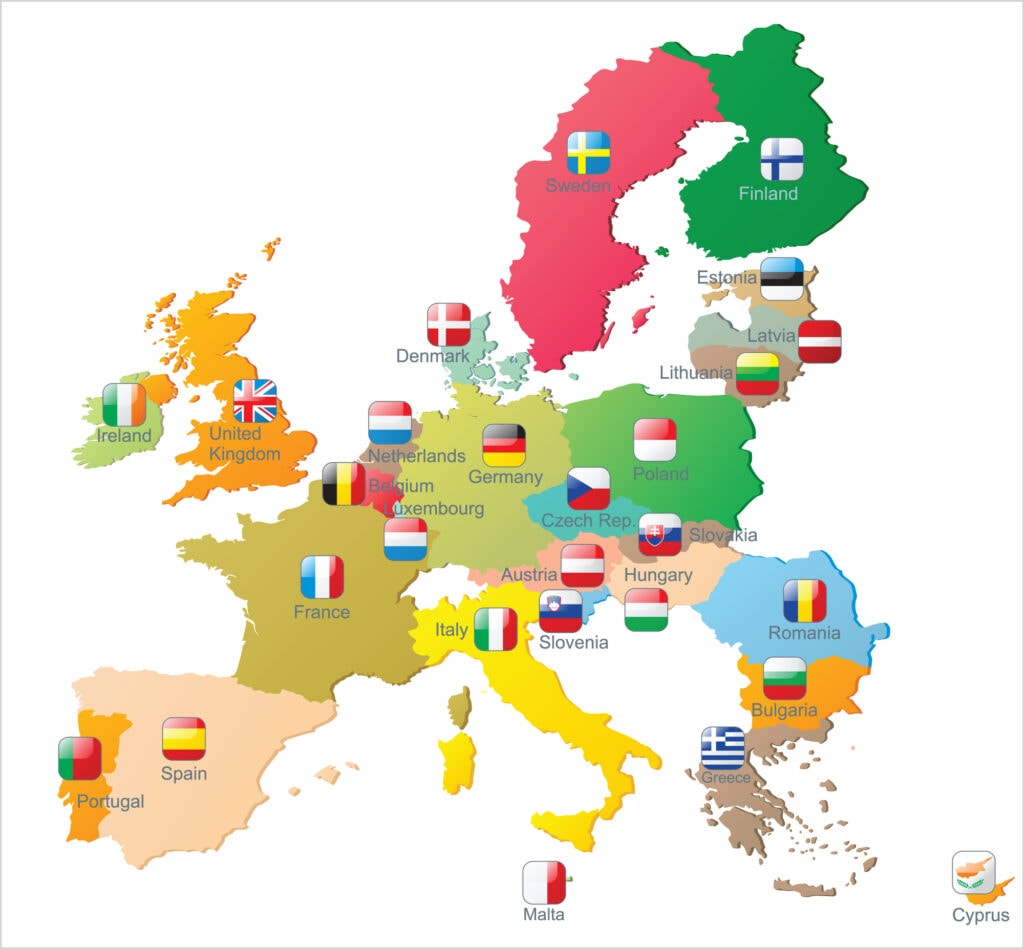
Can I be a digital nomad in Europe?
In the majority of cases, digital nomads are not required to pay taxes in their host country. Many countries around the world have introduced digital nomad visas, including EU countries. A digital Nomad Visa allows remote workers to bypass a tourist visa and short term stays and work abroad. Third-country nationals who wish to stay in the Schengen Area longer than the tourist visa allows can apply for a digital nomad visa.
All figures are based on converting Euro to USA and there will be fluctuations so double check the digital nomad visa requirements when you want to apply.
Digital Nomad Visas in EU Countries
To date there are now over 22 countries in Europe that offer Visa programs designed for Digital Nomads and more are coming on line every day. Currently the UK, Ireland, Denmark and France do not offer Visas. One of the easiest ways to become a Digital Nomad is if you were born in and EU Country or can prove EU descent you are allowed to live and work in any EU nation.

Many countries with digital nomad visas may also require the payment of an application fee which is non-refundable. As a digital nomad, it’s essential to be conscious of your budget, as you can face unexpected expenses while traveling. When choosing your digital nomad destination always look into what the basic cost of living might be in the country you choose. Many remote worker permits require health insurance, an address and a local bank account to be reported on your application.
Albania – The Unique Permit

The permit can be renewed for durations of two years or five years, after which it can be converted into permanent residency. To obtain the permit, applicants must meet certain requirements, including having a valid home employment contract, sufficient income to support themselves and any dependents, health insurance, a clean criminal record, an Albanian bank account, and local accommodation. However, permit holders are only allowed to engage in activities for clients outside of Albania.
If you meet the qualifications, you can live and work in Albania for up to one year without paying taxes, as long as your work is not connected to an Albanian company. Initially, the permit could be renewed for an additional year, and then for another five years, allowing digital nomads to potentially base themselves in Albania for up to five years.
Individuals holding United States passports are eligible to stay in Albania for more than a year without initially needing to apply for a visa. Additionally, digital nomads from Australia, Canada, Japan, Israel, New Zealand, the United Kingdom, and various European countries can stay in Albania for more than 90 days without requiring a visa.
Cost of Visa Application: Free so far
Length: up to 5 years
Income to prove: currently none but expected to be $9,800 per year
Armenia
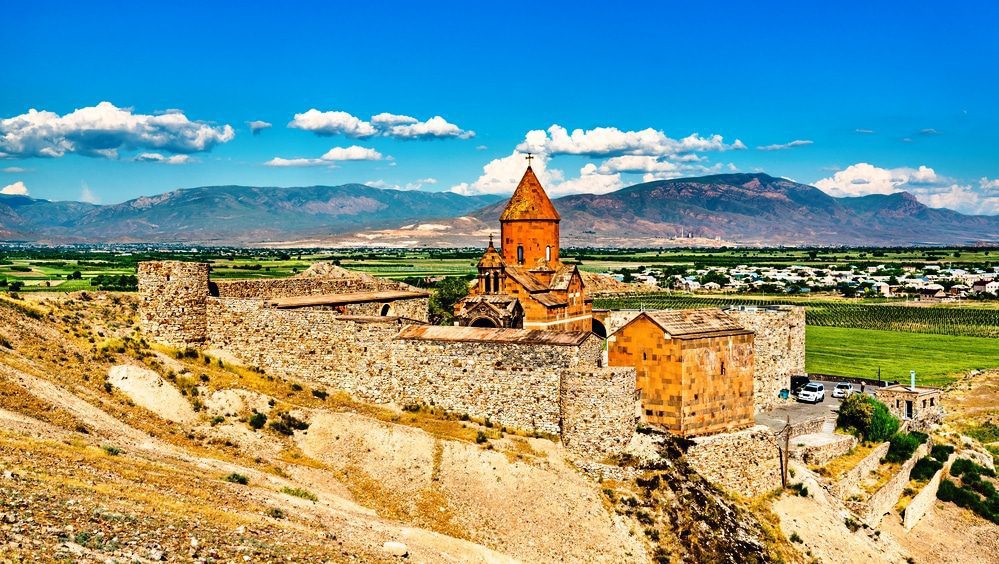
Armenia offers temporary and permanent residence permits to individuals and their families, and holding a residence permit may make you eligible for Armenian citizenship (passport) in just three years of residency.
It’s important to note that you will need to report some income and fulfill tax obligations in Armenia. The tax rates depend on your income or sales, and independent service providers typically choose the “turnover tax” regime, which imposes a 5% tax on reported income.
Cost of Visa Application: The residence permit application fee is AMD 105,000 (around $270) for a temporary (one-year) permit or $365 for a 5 year
Length: 1 year or 5 years depending on visa applied for
Income to prove: None
You might be interested in reading these articles:
Absolute best things to do in Yerevan Armenia
Traditional Armenian food – 45 Armenian dishes you must try
Enchanting Medieval Towns of Europe
Croatia Digital Nomad Visa
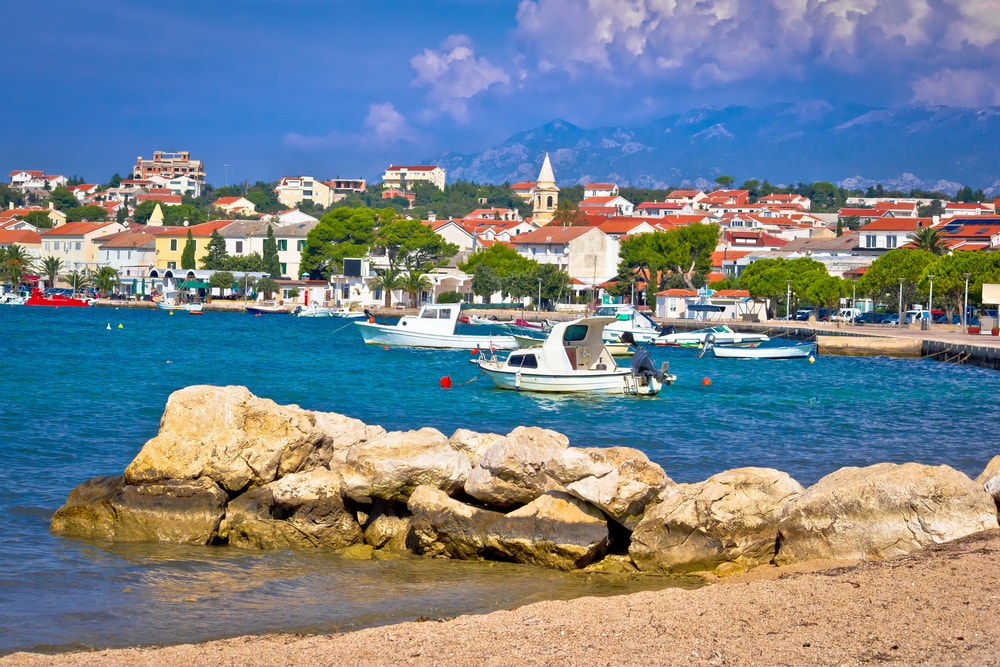
According to the Croatian Ministry of Interior, the Croatia Digital Nomad Visa allows foreign remote workers to relocate to Croatia for a maximum period of one year, with no possibility of extensions, and sometimes even for a shorter duration.
For digital nomads who wish to stay in the country for a longer period, they will need to submit a new visa application six months after their previous permit has expired. This means they must leave Croatia and re-enter the country to reside there again.
Cost of Visa Application:
The payment of administrative fees for temporary stay via Internet banking $50
The payment of a fee for a biometric residence permit via Internet banking in the amount of $35 and 465 for the accelerated application
The payment of an administrative fee for the biometric residence permit via Internet banking in the amount of $10
Length: 1 year
Income to prove: $2500 per month and $34,000 in savings
You might be interested in reading these articles:
The Ultimate 7-Day Croatia Itinerary
Croatian food – Discovering the delicious food of Croatia
Cyprus
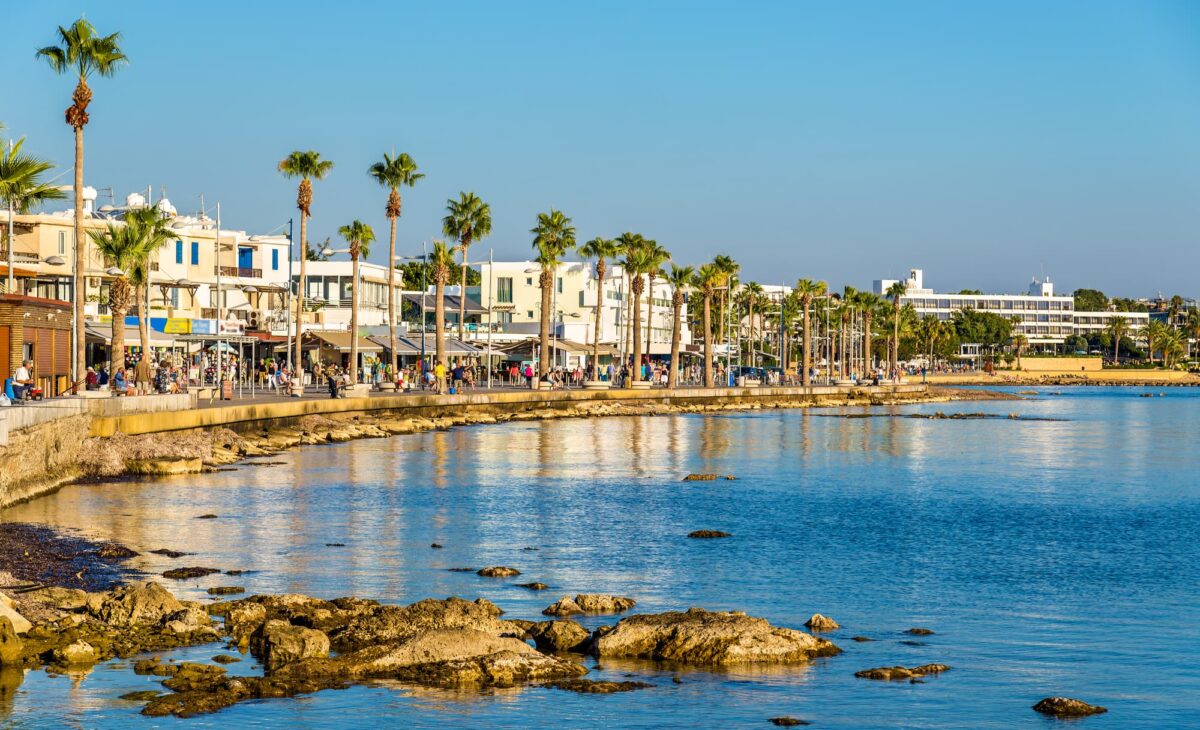
The Cypriot visa is available to non-EU/EEA citizens who work for an employer registered outside Cyprus but the total applications or rather issuing of a Visa is capped at 500. The “Cyprus Digital Nomad Visa” Scheme allows nationals from non-EU and non-EEA countries, who can perform their work location-independently using telecommunications technology, to reside temporarily in Cyprus and work for an employer registered abroad or perform work through telecommunications technology for companies or clients located abroad.
You must have a monthly income of at least $3,800, after the deduction of contributions and taxes.
Cost of Visa Application: $78
Length: 1 year, plus can renew for 2 more
Income to prove: $45,000 per year after taxes
You might be interested in reading these articles:
Visiting the historic Nea Paphos Archaeological Park in Cyprus
31 Fabulous Things to do in Paphos, Cyprus
Agios Neophytos Monastery Cyprus a fascinating sacred site
Visiting the House of Mary in Ephesus Turkey
Czech Republic

The Czech Republic offers the Freelance Visa (Zivno Visa) or Trade License Visa to digital nomads and self-employed individuals, granting them residency rights in the country for a maximum period of one year. However, there is also an opportunity to extend this visa for an additional two years. To be eligible for this visa, applicants must be non-EEA or non-EU citizens and provide evidence that they meet the minimum income requirements.
Cost of Visa Application: $45.00
Length: 1 year
Income to prove: $5694.45 in savings
You might be interested in reading these articles:
29 Unique Things to Do In Prague, Czech Republic
Food in Prague: what to eat in the Czech Republic
Estonia

Estonia grants foreign remote workers who are self-employed, or have an active employment contract with an organization or establishment registered outside of Estonia, residency rights for up to one year. To be eligible for Estonia’s Digital Nomad Visa, individuals must demonstrate proof of earning a monthly income of at least $3900 gross per month for the last six months prior to their application.
Cost of Visa Application: $65
Length: 1 year
Income to prove: At least $3900.00 per month
Finland

It is possible to obtain a digital nomad visa in Finland provided that you meet certain requirements. However, there is not specific program that enables foreign citizens to apply for this specific type of visa. These need to obtain self-employment permits that can be used for completing various types of activities.
The Finnish digital nomad visa has a validity of 6 months.
Cost of Visa Application: $436
Length: 6 months
Income to prove: $3277.00 per month
Georgia Remotely Visa

The Remotely project in Georgia welcomes travelers from 95 visa-free countries, including both nationals and residents. Unlike some other countries, Georgia does not have a specific visa category for digital nomads looking to work remotely. Instead, you simply need to complete a specific application form and provide financial verification, along with any other required information. Once authorized, you and your family will be allowed to travel and work remotely from Georgia.
Cost of Visa Application: Free
Length: One year
Income to prove: $2,000 per month or $24,000 in savings
Who can apply: Residents of 95 countries
Germany – Freiberufler Visa

The German Freelance Visa, in comparison to other Digital Nomad Visas in Europe, involves a more bureaucratic process and has a shorter validity period. To be eligible, applicants must be self-employed individuals or freelancers in specific fields such as healthcare, law, tax, business counseling, science, technology, or linguistics and information transmitting.
Digital nomads can extend their residence permits for up to three years as long as they continue to meet the program’s requirements. It’s important to note that if you obtain the German Digital Nomad Visa, your freelance activity must be registered with the tax office in Germany, rather than the trade office. This means you will need to obtain a tax number for taxation purposes.
Cost of Visa Application: $65 apply at a German Consulate in your home country
Length: 3 months and up to 3 years
Income to prove: This means at least enough for your rent and health insurance, plus $600 per month
You might be interested in reading these articles:
Germany travel guide: 21 places to visit in Germany
34 Tantalizing German foods: what to eat in Germany
Greece Digital Nomad Visa

The Greece Digital Nomad Visa enables non-EU, non-EEA, and non-Swiss citizens who work remotely to establish residency for up to 12 months. The visa can be extended for another year after its expiration and has a relatively straightforward application process.
Cost of Visa Application: $165.00
Length: 1 year
Income to prove: $3,800 per month after tax
You might be interested in reading these articles:
3 Days in Santorini Itinerary: A Bewitching Greek Island
Greek Food Guide: 49 Traditional Dishes to Look For in Greece
Hungary

The Hungary Digital Nomad Visa scheme is referred to as the White Card and has a validity period of one year, which digital nomads can later extend for another year. To be eligible for the visa, applicants must be non-EU, non-EEA, or non-Swiss third-country nationals who can work remotely and earn at least €2,000 monthly.
Cost of Visa Application: $116
Length: 1 year
Income to prove: $2,200 per month
Iceland

While most European countries require that applicants are non-EEA, non-EFTA, or non-EU citizens capable of performing their work remotely and sustaining themselves during their stay to acquire a Digital Nomad Visa, Iceland stipulates a further requirement. Namely, applicants come from a country with a visa-free travel agreement with Iceland. The Iceland digital nomad visa is actually referred to as a long-term visa.
Cost of Visa Application: $120.00
Length: 6 months
Income to prove: $7,600 per month
You might be interested in reading these articles:
Traditional food of Iceland: 36 dishes to try
Wildlife in Iceland and sustainable tourism
Italy – Self-Employment Visa Digital Nomad Visa

Italy, an EU country, is currently in the process of launching its Digital Nomad Visa, allowing non-EU, non-EEA, and non-Swiss foreign remote workers to relocate to Italy, establish residency, and work remotely. This visa is aimed at ‘highly skilled workers’, not just anyone who works remotely.
Although the official Digital Nomad Visa is not yet available, foreign remote workers who wish to establish residency in Italy can apply for the Italian Self-employment Visa. This visa provides residency rights for one year, with the possibility of extension.
Cost of Visa Application: Unknown
Length: 1 year
Income to prove: Minimum gross of $10,000
Eating in Italy: 26 Tips for Eating the Italian way
Calabria itinerary: Ultimate 5-day road trip Southern Italy
Best Things to do for 3 days in Rome
Food in Rome and Where to Eat in Rome
Kyrgyzstan

The new Digital Nomad status will be available to citizens Currently, it is only available to citizens from Russia, Belarus, Kazakhstan, Armenia, Azerbaijan, and Moldova, who work in IT (programming, development, 3D-design and media art, etc) and to their dependants (spouses, children before 18).
Cost of Visa Application: $89
Length: 6 months
Income to prove: Unknown
Latvia – Long Stay Visa

You can apply for a remote work permit if employed by a company of a Member state of the OECD, or if self-employed you require a document from the Tax Office of an OECD state proving your income per month.
Cost of Visa Application: $ 140.00
Length: 1 year
Income to prove: $3500.00 per month
Malta – Nomad Residence Permit

Since its inception in 2001, Malta has been at the forefront of Digital Nomad Visas. The island is a prime destination for digital nomads due to its highly accessible visa requirements, particularly regarding monthly income.
The Malta Digital Nomad Visa grants temporary residency rights to individuals who are not Swiss, EEA, or EU nationals. To be eligible, applicants must provide their remote services with a stable internet connection and be employed by a company outside of Malta.
Initially, the Nomad Residence Permit is valid for up to one year. However, digital nomads have the opportunity to renew their permits as long as they continue to meet the eligibility criteria.
Cost of Visa Application: $330
Length: 1 year
Income to prove: $2,950 per month
You might be interested in reading these articles:
Visiting Malta – 2 fabulous days in Malta
Solo Travel Malta: History, food & culture
Maltese food – the ultimate guide
Montenegro
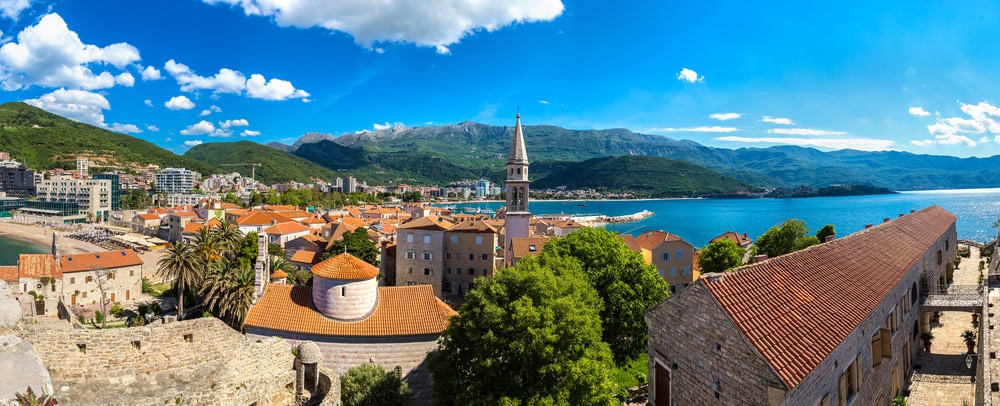
Montenegro is currently in the process of considering a Digital Nomad Visa, but it is not yet available. However, there is an option to apply for a 2-year temporary residence permit in Montenegro. Once the initial 2 years have elapsed, there is also the possibility of extending the permit for an additional 2 years.
The eligibility requirements for the Montenegro Digital Nomad Visa, or residence permit, primarily revolve around the applicant’s employment with a registered company based outside of Montenegro. It is important to note that, based on the available information, there is currently no provision for digital nomads or remote workers who solely rely on freelance work as their source of income.
Cost of Visa Application: Unknown
Length: 2 years
Income to prove: $1500 per month
Norway – Svalbard Digital Nomad Visa

The Norwegian Digital Nomad Visa, also known as the Svalbard Digital Nomad Visa, allows foreign remote workers to establish residency in Svalbard and work remotely from this unique archipelago located between the North Pole and mainland Norway.
To support their digital nomad community and bolster the local economy, the Norwegian government has made the Norwegian Digital Nomad Visa valid for a lifetime. This means that digital nomads can maintain permanent residency in Norway for as long as they choose to work remotely from Svalbard.
To be eligible for the visa, apart from being a foreign national, applicants must demonstrate proof of earning a minimum income of at least €35,000 per year. Additionally, they must have at least one Norwegian client. These requirements ensure that digital nomads contribute to the local economy and have a connection to the Norwegian business landscape.
Cost of Visa Application: $655
Length: the Svalbard digital nomad visa allows a lifelong stay opportunity, as it has no duration.
Income to prove: $40,00 income per year before tax
Portugal

The Portugal Digital Nomad Visa offers an opportunity for non-EU and non-EEA remote workers employed by foreign companies outside of Portugal to establish themselves and work remotely in the country. Anyone can apply. However, if you are from the EU, an EEA country, or Switzerland, you do not need a visa to enter, live, and work in Portugal.
Digital nomads can apply for a temporary resident visa, which grants a validity of up to one year, or they have the option to apply for a residency permit that can be renewed for up to five years. As part of the application process, they are required to provide evidence of income for the past three months, documents confirming their tax residency status, and either a contract of employment or proof of self-employment.
Cost of Visa Application: Estimated $200
Length: 1 year, but has a residency option
Income to prove: $3000 per month
You might be interested in reading these articles:
Portugal Travel Guide – 27 must-visit places
The Best Traditional Portuguese Food: feasting in Portugal
Romania’s Digital Nomad Visa

The digital nomad visa program in Romania follows a similar structure to other European countries. It specifically caters to digital nomads, defined by Romanian authorities as “foreigners who are employed under a contract by a company registered outside Romania, or who own a company registered outside Romania and can work remotely as an employee or within their own company.”
This visa is available to all non-EU citizens who wish to work remotely from Romania. The objective of this program is to attract approximately 2000 digital nomads annually.
Cost of Visa Application: $195 this includes residence visa fee
Length: 1 year and renewable
Income to prove: $4040.00 per month
You might be interested in reading these articles:
23 Awesome Things to Do in Bucharest
Serbia

A Serbian digital nomad visa is addressed to foreigners who want to work remotely from this country. Basically, this type of visa is a temporary residence permit for foreigners interested in this type of work.
Foreigners can also apply for sole proprietorship visas if they want to run their own business in Serbia, as digital nomads. If for temporary residence visa you need to deposit approximately EUR 500 in a local bank account, for sole proprietorship it is around EUR 260. Here are other costs:
Registration tax for sole proprietorship visa – Around EUR 15.
Fee for temporary residence permit – Around USD 110.
Cost of Visa Application: Varies
Length: 1 year
Income to prove: $3,900 per month
Spain

Spain’s digital nomad visa is a remote work visa gives non-EU nationals the chance to live and work in Spain for up to five years.
They need to prove they have worked with their clients or company for more than three months before applying, and the company they work for must have been operational for at least one year.
Cost of Visa Application: $90
Length: 1 year, can reapply for up to 4 more years
Income to prove: 31,752 EUR annually, which is 2,646 EUR monthly.
You might be interested in reading these articles:
Ronda, Spain: A Local’s Itinerary for a Perfect 2 Day Trip
Things to do in Malaga, Spain: by a Local
Spanish Food: 43 of the best foods in Spain
Celebrating Christmas in Spain: 22 Traditional Spanish customs
Things to remember about getting a digital nomad visa for Europe
To obtain a digital nomad visa for Europe, there are several steps you need to take. First, research the specific requirements and eligibility criteria of the country you wish to visit. Each country has its own rules and regulations, so it’s important to familiarize yourself with them.
Next, gather all the necessary documents, such as proof of sufficient funds, health insurance, and a clear criminal record. Some countries may require additional documentation like a business plan or a letter of intent.
Once you have all the required paperwork, submit your application to the respective embassy or consulate of the country you want to stay in. Be sure to carefully follow the instructions and provide accurate information. After submitting your application, you may need to schedule an interview or attend an appointment at the embassy.
If approved, you will receive your digital nomad visa, allowing you to live and work in Europe for a specific period of time. Remember to keep track of your visa’s expiration date and comply with any additional requirements during your stay.

